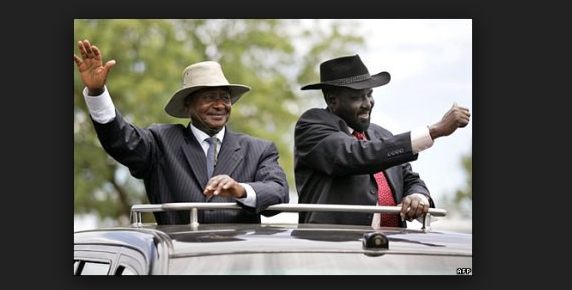After President Museveni’s impromptu visit up north on Thursday, the UN Security Council on Friday rejected a US-drafted resolution on imposing an arms embargo and sanctions on South Sudan amid divisions over how to pressure leaders to end the three-year war.
READ: Museveni rushes Juba to help Kiir after UN announces vote on arms embargo
Museveni’s influence could have proved the difference after the three African council members — Angola, Egypt and Senegal — were not swayed and they all abstained. It garnered only seven votes in favor in the 15-member council, while eight countries including Russia, China and Japan abstained. Nine votes and no veto are required for resolutions to be adopted in the council.
Just this week, Egyptian President, His Excellency Field Marshal Abdel Fattah El-Sisi paid Mr Museveni a visit in Entebbe and the the measure presented by the United States to blacklist Juba’s military is sought to have been high on the agenda.
On Salva Kiir’s beseech, Gen. Museveni may have also implored Angolan leader José Eduardo dos Santos, a long term ally of his and H.E Macky Sall the incumbent head of state of Senegal as well.
VIDEO: Danger as Museveni, Egyptian President’s guards fight at State House Entebbe
The United States, backed by Britain and France, had argued that cutting off the arms flow was urgently needed following UN warnings of a risk of mass atrocities.
The United States had also sought to put rebel leader Reik Machar, army chief Paul Malong and Information Minister Michael Makuei on a sanctions blacklist, subjecting them to an assets freeze and a global travel ban.
Machar has before blasted President Museveni, accusing Uganda of fuelling the fighting in the world’s youngest nation.
The world’s youngest nation, South Sudan descended into war in December 2013, leaving tens of thousands dead and more than 3.1 million people displaced.
Uganda’s military influence in South Sudan
Before the civil war, UPDF crossed the border into South Sudan days before the 15 December 2013 crisis and eventually took part in the direct combat against the opposition forces of Machar in assisting President Kiir’s forces.
Thousands of Ugandan forces backed by helicopter gunships, tanks and other armoured vehicles pushed back poorly armed opposition forces, mainly of armed young civilians from the Lou-Nuer community in Jonglei state.
The troops of the southern neighbour also provided much of the security for the capital, Juba, including the airport and protection of the top leadership in the capital during the 21 months of the civil war.
Uganda argued that it sent troops in order to avoid genocide from occurring in South Sudan.
But opposition faction of the SPLA-IO accused the UPDF of instead taking side in the internal war and prolonging it.
Some 1.3 million South Sudanese have fled across borders as refugees, including 383,000 who have fled to Uganda since July, according to UN figures.











